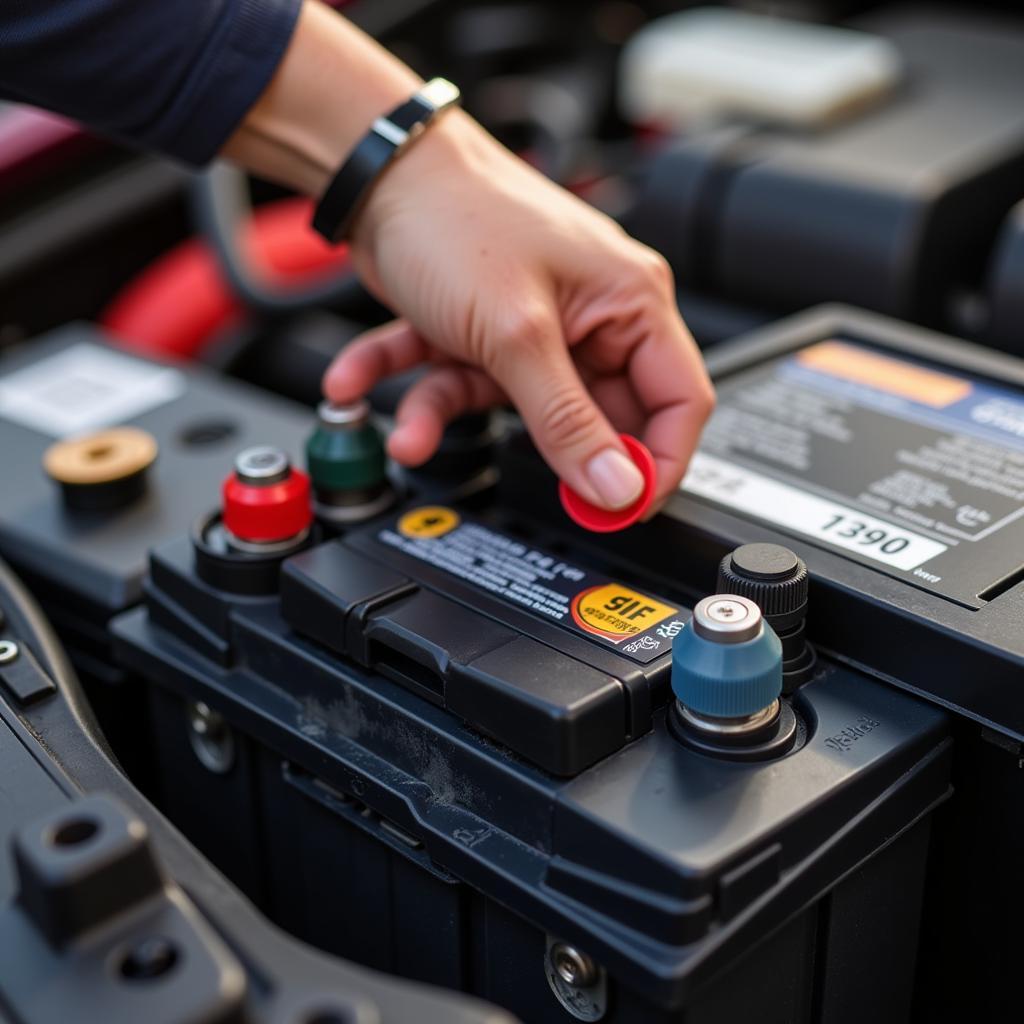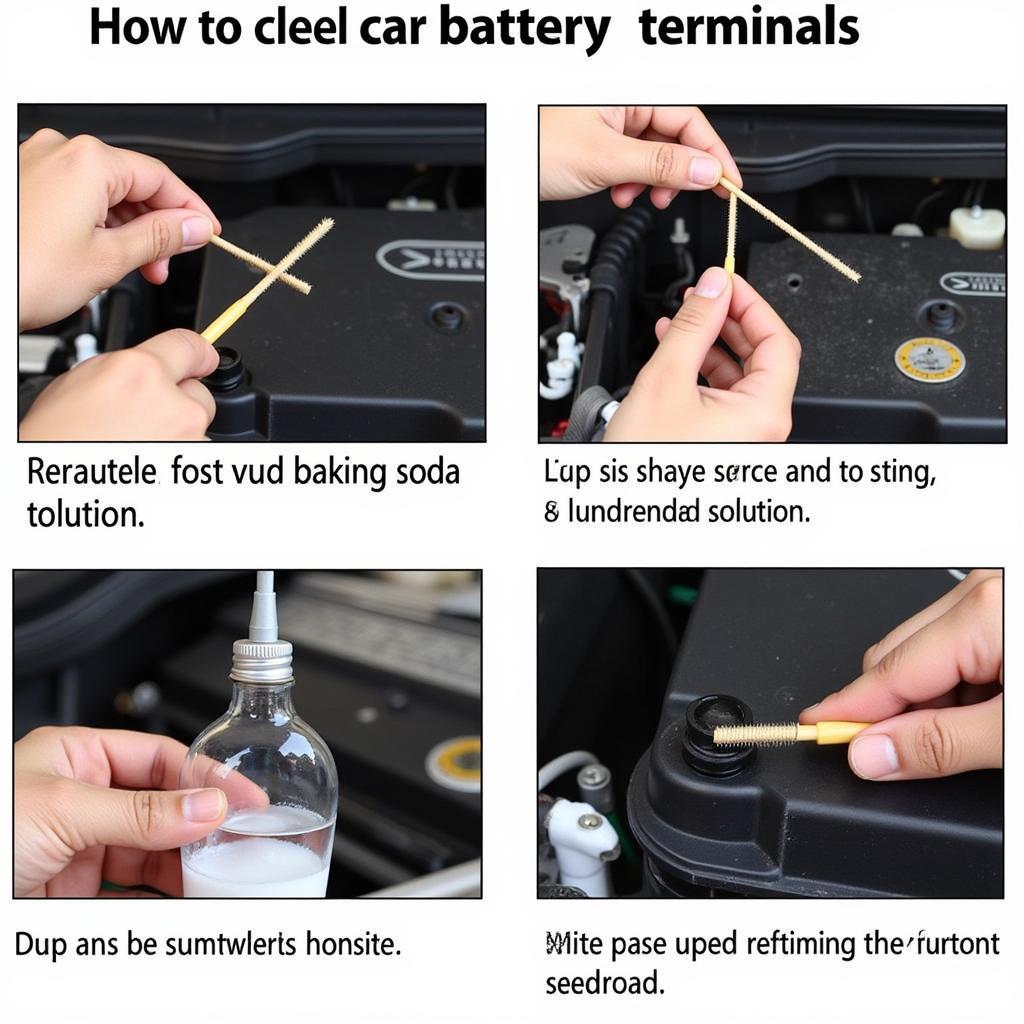Knowing if your car battery is conventional or maintenance-free is crucial for proper car care. This seemingly simple question can significantly impact your maintenance routine and even influence your battery replacement choices. Let’s delve into the key differences and how to identify which type you have.
One common misconception is that maintenance-free batteries require no attention at all. While they require significantly less maintenance than conventional batteries, they still need periodic checks and eventual replacement. maintenance free batteries for cars provide more details on this. But how can you tell which type resides under your hood?
Identifying Your Car Battery Type
Visual Inspection: The Quickest Way to Determine if Your Car Battery is Maintenance Free
The easiest way to identify your battery type is by looking for filler caps. Conventional batteries typically have six filler caps, one for each cell, often marked with “+” and “-” symbols. These caps allow you to top off the electrolyte levels with distilled water. Maintenance-free batteries, on the other hand, are often sealed and may have a smooth top with no visible caps. Sometimes, they might have a small, covered vent for gas release.
 Inspecting a Car Battery for Filler Caps
Inspecting a Car Battery for Filler Caps
Checking the Battery Label: Deciphering the Manufacturer’s Markings
The battery label is another valuable source of information. Look for terms like “maintenance-free,” “sealed,” or “low-maintenance.” If you see these, you likely have a maintenance-free battery. Conversely, if the label mentions adding water or checking electrolyte levels, it’s probably a conventional battery.
Maintenance Requirements: Conventional vs. Maintenance-Free
Why Routine Checks Matter, Regardless of Your Car Battery Type
Conventional batteries require regular checks of the electrolyte level and topping off with distilled water as needed. This is essential to prevent damage from low electrolyte levels. Maintenance-free batteries, while sealed, still benefit from periodic cleaning of the terminals and checking the voltage to ensure optimal performance. Learn more about general car upkeep through self service car maintenance. This applies to all vehicles, whether they use conventional or maintenance-free batteries.
“Regular battery checks, even for maintenance-free types, are crucial for preventing unexpected starting issues,” says John Smith, Senior Automotive Technician at Speedy Auto Repairs.
How Battery Type Affects Your Maintenance Schedule
The frequency of checks differs significantly between the two types. Conventional batteries might require electrolyte checks every few months, especially in hotter climates. Maintenance-free batteries typically need checking only a couple of times a year.
The Pros and Cons of Each Battery Type
What are the advantages of a maintenance-free battery?
Maintenance-free batteries offer the convenience of minimal upkeep and are less prone to leaking. They also tend to have a longer lifespan than conventional batteries.
What are the disadvantages of a maintenance-free battery?
While often more expensive initially, the reduced maintenance and longer lifespan can offset the higher upfront cost. However, once a maintenance-free battery fails, it typically needs replacement rather than repair.
“While maintenance-free batteries offer convenience, understanding their specific needs is still vital for maximizing their lifespan,” adds Jane Doe, Lead Battery Engineer at PowerCell Technologies.
 Cleaning Car Battery Terminals
Cleaning Car Battery Terminals
Conclusion: Knowing Your Battery Type is Key
Understanding whether your car battery is conventional or maintenance-free is crucial for proper maintenance and ensuring its longevity. By performing simple visual inspections and checking the battery label, you can easily determine your battery type and adopt the appropriate maintenance practices. For more insights into vehicle maintenance, explore the resources available on what routine maintenance is required for an electric car. If you need further assistance or have any questions regarding your car battery, don’t hesitate to contact us at AutoTipPro at +1 (641) 206-8880 or visit our office at 500 N St Mary’s St, San Antonio, TX 78205, United States. We’re always happy to help! You might also be interested in learning more about maintenance free car battery with caps on top. Finally, if you’re considering a hybrid vehicle, you’ll find valuable information about their reduced maintenance needs at hybrid cars require less maintenance.
FAQ
- How often should I check my conventional car battery? Every few months, especially during hot weather.
- Do maintenance-free batteries really require no maintenance? They require less maintenance than conventional batteries, but still need periodic checks and eventual replacement.
- What is the lifespan of a maintenance-free battery? They generally last longer than conventional batteries, typically 3-5 years or more.
- Can I jump-start a car with a maintenance-free battery? Yes, you can jump-start a car with a maintenance-free battery just like a conventional battery.
- How do I dispose of a car battery? Take it to a recycling center or auto parts store that accepts used batteries.
- What are the signs of a failing car battery? Slow engine cranking, dim headlights, and clicking sounds when turning the key are common signs.
- Are maintenance-free batteries better for the environment? They are often considered more environmentally friendly due to their sealed design, which reduces the risk of acid spills.






Leave a Reply